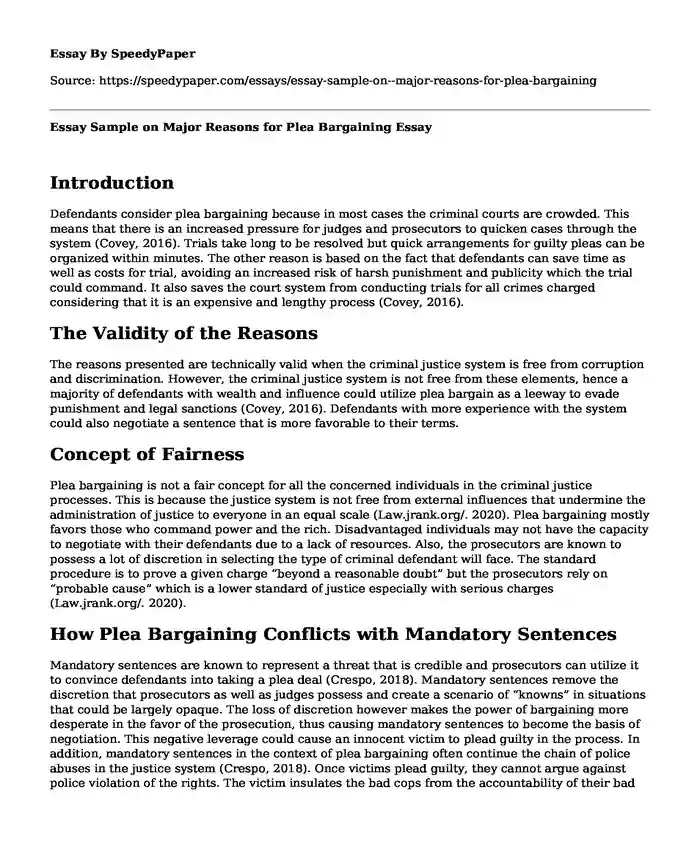
| Type of paper: | Essay |
| Categories: | Law Court system Criminal justice |
| Pages: | 3 |
| Wordcount: | 802 words |
Introduction
Defendants consider plea bargaining because in most cases the criminal courts are crowded. This means that there is an increased pressure for judges and prosecutors to quicken cases through the system (Covey, 2016). Trials take long to be resolved but quick arrangements for guilty pleas can be organized within minutes. The other reason is based on the fact that defendants can save time as well as costs for trial, avoiding an increased risk of harsh punishment and publicity which the trial could command. It also saves the court system from conducting trials for all crimes charged considering that it is an expensive and lengthy process (Covey, 2016).
The Validity of the Reasons
The reasons presented are technically valid when the criminal justice system is free from corruption and discrimination. However, the criminal justice system is not free from these elements, hence a majority of defendants with wealth and influence could utilize plea bargain as a leeway to evade punishment and legal sanctions (Covey, 2016). Defendants with more experience with the system could also negotiate a sentence that is more favorable to their terms.
Concept of Fairness
Plea bargaining is not a fair concept for all the concerned individuals in the criminal justice processes. This is because the justice system is not free from external influences that undermine the administration of justice to everyone in an equal scale (Law.jrank.org/. 2020). Plea bargaining mostly favors those who command power and the rich. Disadvantaged individuals may not have the capacity to negotiate with their defendants due to a lack of resources. Also, the prosecutors are known to possess a lot of discretion in selecting the type of criminal defendant will face. The standard procedure is to prove a given charge “beyond a reasonable doubt” but the prosecutors rely on “probable cause” which is a lower standard of justice especially with serious charges (Law.jrank.org/. 2020).
How Plea Bargaining Conflicts with Mandatory Sentences
Mandatory sentences are known to represent a threat that is credible and prosecutors can utilize it to convince defendants into taking a plea deal (Crespo, 2018). Mandatory sentences remove the discretion that prosecutors as well as judges possess and create a scenario of “knowns” in situations that could be largely opaque. The loss of discretion however makes the power of bargaining more desperate in the favor of the prosecution, thus causing mandatory sentences to become the basis of negotiation. This negative leverage could cause an innocent victim to plead guilty in the process. In addition, mandatory sentences in the context of plea bargaining often continue the chain of police abuses in the justice system (Crespo, 2018). Once victims plead guilty, they cannot argue against police violation of the rights. The victim insulates the bad cops from the accountability of their bad conduct.
Significant Problems Regarding Plea Bargaining
Plea bargaining becomes problematic especially when the prosecutor in question is avoiding problems with the case presented. The case may lack a witness, or the evidence brought forward by forensic investigation may not be convincing to the judge (HG.org, 2020). At times the defendant could appear sympathetic. Acceptance of plea bargain could be leading the defendant to a conviction that may not be acquired by the prosecutor based on the case.
Sometimes the defendant may plead guilty of the crime not committed at all because of the fear of consequences that could be awaiting him/her (HG.org, 2020). However, once the victim pleads guilty, the damage cannot be reversed because the conviction states otherwise. In highly sensitive cases such as murder, pleading guilty could have devastating consequences to the defendant, even if he/she is innocent.
The other challenge is the fact that the courts are not bound with agreements made between the prosecutor and the defendant, and courts must always approve such agreements (HG.org, 2020). It requires that the defendant is aware of the set terms of the plea agreement. The other challenge is criminal records. While accepting a trial could free a defendant of the criminal records, plea bargaining on the other hand wields consequences including a minimal chance of one’s name being scrapped off the criminal record and such records bear heavy costs in one’s life (HG.org, 2020).
References
Covey, R. D. (2016). Plea Bargaining and Price Theory. Geo. Wash. L. Rev., 84, 920. http://www.gwlr.org/wp-content/uploads/2016/08/84-Geo.-Wash.-L.-Rev.-920.pdf
Crespo, A. M. (2018). The Hidden Law of Plea Bargaining. Columbia Law Review, 118(5), 1303-1424. https://dash.harvard.edu/bitstream/handle/1/37122603/Hidden%20Law%20%28final%29.pdf?sequence=1&isAllowed=y
HG.org. (2020). What Are the Advantages and Disadvantages of Accepting a Plea Bargain? https://www.hg.org/legal-articles/what-are-the-advantages-and-disadvantages-of-accepting-a-plea-bargain-33881
Law.jrank.org/. (2020). Plea Bargaining - Plea Bargaining: A Shortcut to Justice. https://law.jrank.org/pages/9227/Plea-Bargaining-Plea-Bargaining-Shortcut-Justice.html.
Cite this page
Essay Sample on Major Reasons for Plea Bargaining. (2023, Oct 06). Retrieved from https://speedypaper.com/essays/essay-sample-on--major-reasons-for-plea-bargaining
Request Removal
If you are the original author of this essay and no longer wish to have it published on the SpeedyPaper website, please click below to request its removal:
- Essay Advising on How to Fight Whate-Collar and Street Crimes
- Law Essay Sample: How Sex Offender Legislation Might Influence Recidivism
- How did Marijuana Become Illegal? Free Essay Sample
- Essay Sample on Legalization of Cannabis in the UK
- Paper Sample on Black-White Disparities in the Criminal Justice System
- Free Essay. How the Convict Labor System Was Worse Than Slavery
- Essay Sample on Rationalizing Crime: An Economic Perspective on Bank Robberies and Societal Implications
Popular categories




